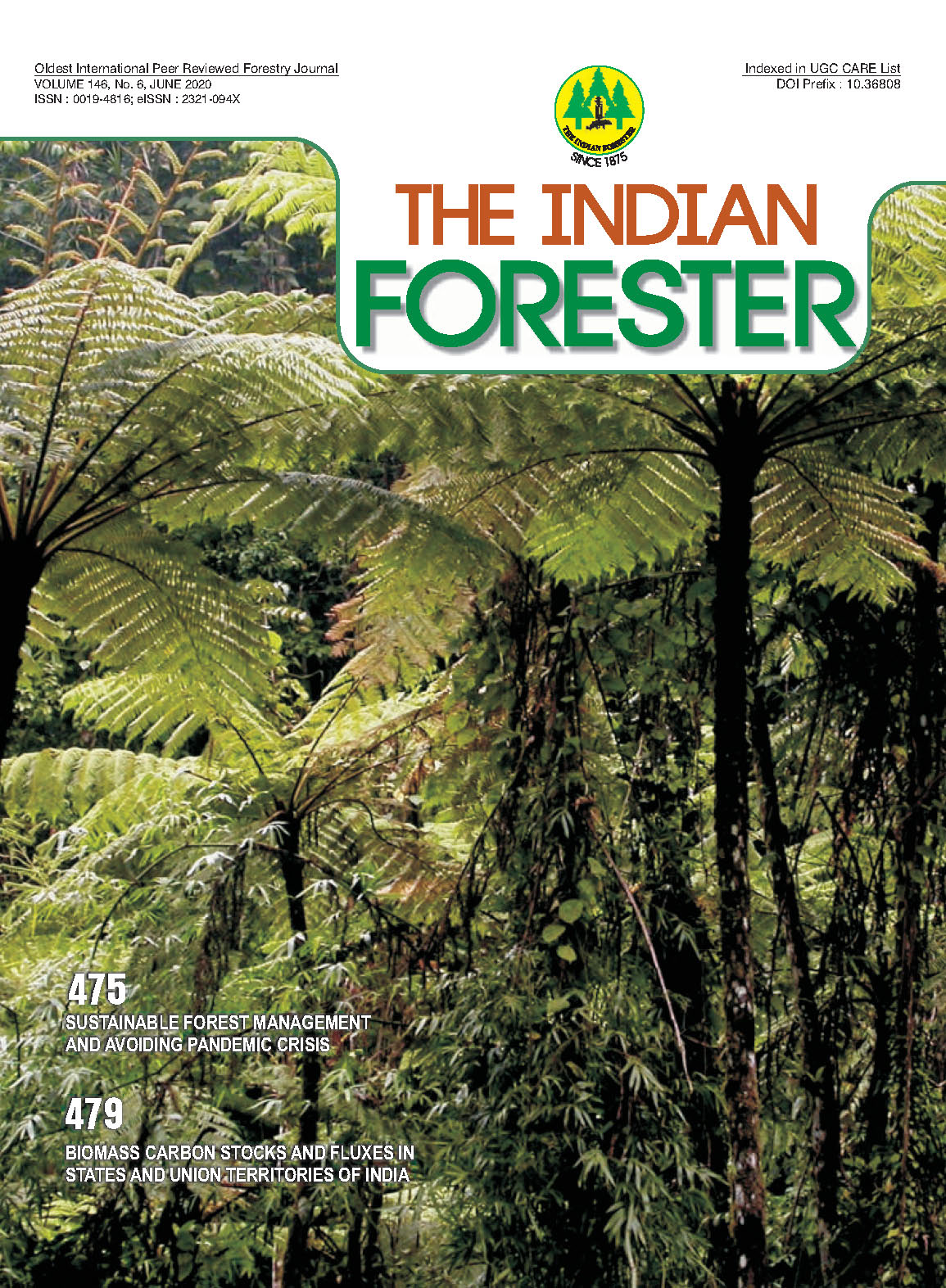Wood Microstructural Study of Selected Exotic Tree Species of Forest Research Institute, Dehradun
DOI:
https://doi.org/10.36808/if/2020/v146i6/145843Keywords:
Comparative Wood Anatomy, Exotic Species, IAWA, Environmental Conditions, Wood Microstructure.Abstract
The wood microstructure of exotic hardwood tree species planted in Forest Research Institute, Dehradun campus has been described. The objective of the present study is to analyze the differences in wood microstructure between the tree species from their native place and plantations. To study the wood microstructure, branch wood samples were collected and processed as per the standard laboratory procedures. The wood anatomical features were described as per the IAWA (International Association of Wood Anatomists) terminology of hardwood identification.
The results indicated that wood qualitative microstructure did not vary when compared with the previous work done on these species supporting the fact that wood anatomy is conservative. However, some quantitative parameters of vessel, fibre and ray differed in most of the selected hardwood species. Tyloses and gum deposits were found to be absent in the branch samples of the species. These findings are attributed to the wood sample selection from branches and the change in environmental conditions.
References
Agarwal M. and Gupta S. (2008). Wood anatomy of Sapindales. Bishen Singh Mahendra Pal Singh, Dehra Dun, 172 pp.
Bailey I.W. and Tupper W.W. (1918). Size variation in tracheary cells: A comparison between the secondary xylem of vascular cryptogams, gymnosperms and angiosperms. Proceedings of the American Academy of Arts and Sciences. 54(2): 149-204.
De Micco V., Balzano A., Wheeler E.A. and Baas P. (2016). Tyloses and gums: a review of structure, function and occurrence of vessel occlusions. IAWA journal, 37(2): 186-205.
IAWA Committee (1989). IAWA list of Microscopic Features for Hardwood Identification.IAWA Journal, 10(3): 291-332.
Kiaei M. and Roque R.M. (2015). Physical properties and fiber dimension in stem, branch and root of alder wood. Fresenius Bulletin, 24(1b): 335-342.
Maiti R., Rodriguez H.G., Para A.C., Aruna-Kumari C.H. and Sarkar N.C. (2016). A comparative wood anatomy of 15 woody species in north-eastern Mexico. Forest Research, 5(1): 100-166.
Miller R.B. (1975). Systematic anatomy of the xylem and comments on the relationships of Flacourtiaceae. Journal of the Arnold Arboretum, 56(1): 20-102.
Richter H.G. and Dallwitz M.J. (2000). Commercial Timbers: Descriptions, Illustrations, Identification, and Information Retrieval, Version 4, May 2000.
Sidiyasa K. (1998). Taxonomy, phylogeny, and wood anatomy of Alstonia (Apocynaceae). Blumea. Supplement, 11(1): 1-230.
Sosef M.S.M., Hong L.T. and Prawirohatmodjo S. (1998). Plant resources of South-East Asia. No. 5 (3): Timber trees: lesser-known timbers.
Tyree M.T. and Ewers F.W. (1991). The hydraulic architecture of trees and other woody plants. New Phytologist, 119(3): 345-360.
Wheeler E.A. (2011). Inside Wood A web resource for hardwood anatomy. Iawa Journal, 32(2): 199-211.
Wheeler E.A., Lee S.J. and Baas P. (2010). Wood anatomy of the Altingiaceae and Hamamelidaceae. IAWA journal, 31(4): 399-423.
Zimmermann M.H. and Jeje A.A. (1981).Vessel-length distribution in stems of some American woody plants. Canadian Journal of Botany, 59(10): 1882-1892.
Downloads
Downloads
Published
How to Cite
Issue
Section
License
Unless otherwise stated, copyright or similar rights in all materials presented on the site, including graphical images, are owned by Indian Forester.





